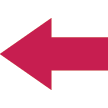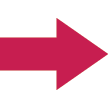Teaching Tools
Tools for teaching sexual health
Everyone can teach sexual health. Use these teaching tools to help you learn about healthy relationships and sexual health, prepare for conversations, and get ready to do activities and lessons. Provide young people with intellectual and developmental disabilities with holistic sexual health education that helps them learn:
- Who they are
- What their rights are
- How to express themselves
- How to build healthy relationships
Make sexual health education accessible
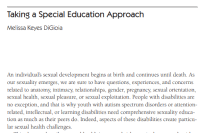
Make sexual health education as accessible as possible. Use the Taking a Special Education Approach guide to learn effective approaches for teaching sexual health education to young people with I/DD and ways to adapt materials to individual needs.
Sex Ed for Students with Differing Abilities
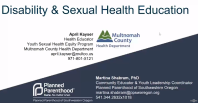
This recorded webinar was hosted by the Oregon Department of Education and features April Kayser of the SHEIDD project and Martina Shabram, PhD of Planned Parenthood of Southwestern Oregon. The webinar provides: 1) An overview of historical perspectives on disability and current statistics on students with disabilities in Oregon communities; 2) Practical examples of how sexual health lessons can be adapted and modulated to meet the particular needs of students with disabilities; 3) Tips for talking with young people and their families about the importance of clear, comprehensive, and frank sexual health education.
Teaching tools
You can use a curriculum to help you prepare for conversations about relationships and sexuality, choose specific activities and lessons to help people learn about sexual health, or to teach an entire sexual health education class.
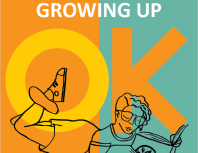
Growing Up OK is a puberty guide and coloring book provided by the Centre for Sexuality.
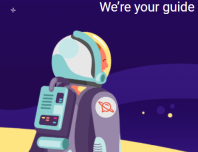
Planet Puberty is an Australian resource website that provides tools to parents and other adults to help them support Autistic young people and youth experiencing intellectual disability through puberty. The website is available in multiple languages including Spanish, Chinese, and Russian.
IMPORTANT: This resource describes puberty as something that happens to “girls” and “boys,” which makes assumptions about peoples’ genders and body parts, and can exclude the experiences of trans, non-binary, and intersex people. If you use this resource, we recommend adapting the lessons to be inclusive of all bodies and genders. See the Growing Up OK guide above as an example of more inclusive puberty education.
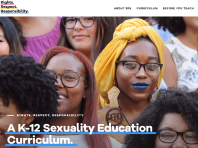
Advocates for Youth’s Rights, Respect, Responsibility (3Rs) curriculum is a sexuality education curriculum with lessons for Kindergarten through 12th grade available for free online. On the website, you can search the curriculum by topic to access different lesson plans and get ideas for how to adapt lessons and concepts. Lessons available in English and Spanish.
The SHEIDD Community Advisory Group reviewed a number of healthy relationships and sexuality education curricula designed for people with disabilities. We ranked them based on how holistic we found them to be and shared our opinions on some of the strengths and weaknesses of each curriculum.
We learned that all of these sexual health curricula need to be adapted to be more rights-based, sensitive to individual and collective trauma (view a Guide to Trauma-Informed Sex Education) and inclusive and affirming of people of all genders and sexual orientations, races and cultures. Some of the curricula have out-of-date or incorrect sexual health information. For example, many do not share information about all pregnancy prevention methods and imply that all protection methods are 100% effective at preventing pregnancy or sexually transmitted infections (STIs).
Here is the list of curricula that were reviewed and their rank:
- Sexuality Education for Adults with Developmental Disabilities (Second Edition 2010)
- Friendships & Dating Program (2003-2017)
- Positive Prevention PLUS: Sexual Health Education for America's Youth for Special Populations in Schools or Community Settings (2016)
- Special Education Family Life and Sexual Health (FLASH) (1985-2011)
- SAFE SECS: Sexuality Awareness For Educating Special Education Curriculum Students (2015)
- Getting to the Heart of Intimacy (2009)
- CIRCLES (1983, 1993)
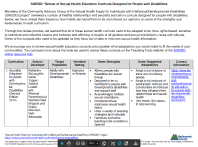
Learn more about the curricula strengths and weaknesses.
We encourage you to review sexual health education curricula and consider what adaptations you would make to fit the needs of your communities. Learn more about the curricula review process.
